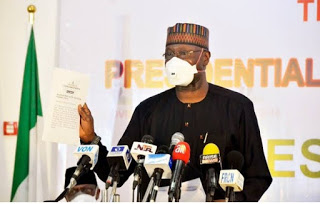66 Nigerian soldiers who are currently serving their jail sentences in the Nigeria Correctional Service (NCS) facility, Kirikiri, Lagos have dragged the Minister of Interior, Rauf Aregbesola to court over their continued incarceration.
The soldiers filed the suits at the Federal High Court in Lagos.
In three separate suits filed through Falana & Falana Chambers on August 18, the soldiers listed the Minister of Interior, Rauf Aregbesola, and the Comptroller-General of the Nigeria Correctional Service (NCS), Ja’afaru Ahmed, as first and second respondents respectively.
According to the soldiers, the defendants have refused to include them among beneficiaries of the amnesty granted by President Muhammadu Buhari in April when he ordered the decongestion of prisons to curb the spread of COVID-19, despite the fact that they had served 75% of their jail term.
Announcing the criteria for the pardon, Mr Aregbesola disclosed that those considered were inmates who were 60 years old and above, and those battling terminal illnesses.
Other criteria include convicts serving three years and lower who have less than six months to serve, those with mental health issues, and inmates with options of fines not exceeding N50,000 and who have no pending case.
According to Mr Aregbesola, the amnesty did not apply to inmates sentenced for violent extreme offences such as terrorism, kidnapping, armed banditry, rape, human trafficking, and culpable homicide.
The 66 convicted soldiers sought an order for the respondents to release them in compliance with the “Presidential Amnesty granted on April 9, 2020, by President Muhammadu Buhari of the Federal Republic of Nigeria pursuant to Prerogative of Mercy under Section 175 of the Constitution of Federal Republic of Nigeria, 1999 (As Amended).”
Also, they prayed the court to direct the duo to pay them N20 million each as compensation for the violation of their fundamental rights to personal liberty.
Human rights lawyer, Femi Falana, had earlier written to Mr Aregbesola, requesting the release of the soldiers, who he said have remained in prison custody despite qualifying for the amnesty.
In three separate letters to Mr Aregbesola, Mr Falana said the soldiers, who were convicted and had served more than 75 per cent of their time, had remained in custody
According to the application of August 18, 35 of the convicted soldiers were tried before a General Court-Martial on a six-count charge, including mutiny and attempted murder.
At the end of the trial, they were convicted and sentenced to death in a judgment delivered in December 2014.
It was stated that upon a review of the case, the confirming authority upheld their conviction but commuted the death sentence to 10 years imprisonment.
“Since the convicted soldiers are entitled to remission of the 10-year jail term they are required to spend a total of 80 months in prison custody. From August 2014 to May 2020 the Applicants have spent over 64 months in custody. Thus, the Applicants have spent over 75% of their prison term.
Mr Falana noted that one of the 35, Stephen Clement, a corporal, was released from prison custody on April 28 on the ground that he had spent more than 75 per cent of his 10-year prison term in line with the terms of the Presidential Amnesty of April 9, 2020.
Also qualified for the amnesty, according to the lawyer, is another set of 19 soldiers who were tried before a General Court-Martial on a six-count charge and sentenced to death in a judgment delivered in December 2014.
Similar to the 35, upon a review of the case, the confirming authority upheld the conviction but commuted the death sentence to 10 years imprisonment.
Since the convicted soldiers are entitled to remission of the 10-year jail term, Mr Falana said they are required to spend a total of 80 months in prison custody.
“From August 2014 to May 2020 the Applicants have spent over 64 months in custody. Thus, the Applicants have spent over 75% of their prison term,” the lawyer argued for the convicts.
Unlike the other two categories, 12 soldiers, including Yusuf Shuaibu, Friday Onuh, Igomu Emmanuel and Stephen Clement, all lance corporals; were sentenced to death between August and September 2014.


















